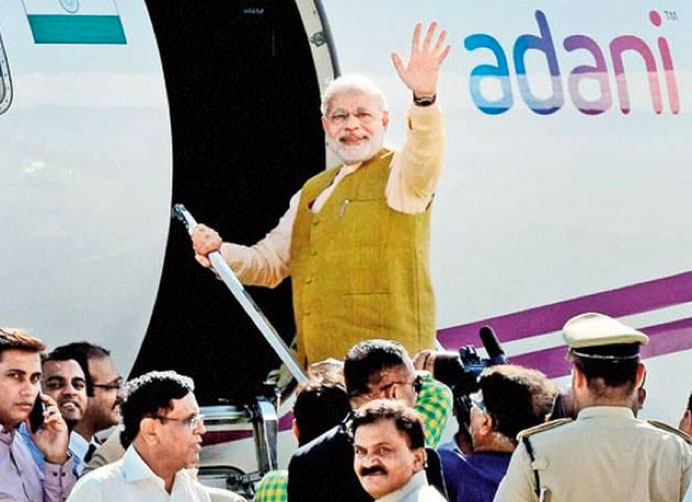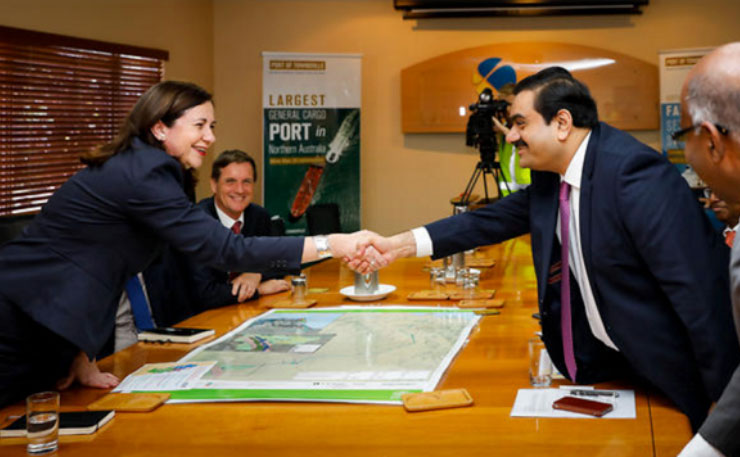In politics, it’s sometimes hard to separate fact from fiction. And it can be particularly hard to tell delusion from corruption, writes Ben Eltham.
There are some policy issues that are complex and difficult to resolve. Some problems aren’t easily understood, and even if policy makers and leaders understand them, there are no easy answers. Politicians will always have a difficult job balancing the needs of different groups in the community, especially where helping one group harms another.
It’s not hard to think of a few of these ‘wicked problems’, as they are sometimes called. Housing affordability falls into this category: making houses cheaper means house prices falling. That will hurt home owners. Tax reform is another example. Simplifying the tax system is meant to be good for everyone. But it means removing cherished tax concessions from people who don’t want to lose them, such as wealthy superannuants. These are just the sort of people who know how to complain vocally to politicians.
But not everything in politics is complex and difficult. There are some policy issues that are remarkably simple. Stunningly obvious, even. No-brainers, you might call them.
One example of a no-brainer is the Carmichael coal mine in central Queensland.
When it comes to no-brainer policy issues, it doesn’t get much easier than this. Should we allow one of the world’s largest coal mines to be built in Queensland?
No, we shouldn’t. No government should, especially not the governments of Queensland and Australia. It doesn’t make sense on any level: economically, environmentally, socially … even politically. And we certainly shouldn’t be lending $1 billion of taxpayer’s money to build it.
Here is an issue where the evidence, the politics, and even ordinary common sense line up on one side of the issue … and politicians on the other.
Let me break it down for you.
The Carmichael coal mine will dig up coal. Lots of coal. Coal is damaging the atmosphere. Coal is destroying the world’s climate. Coal is killing the Great Barrier Reef.
There’s really no other way to say it: coal is bad for humanity.
Any new coal mine is a bad idea, but Carmichael is so big it staggers the imagination. Its open cut pit will stretch 40 kilometres. The proposed mine will be so big, if you stood at the top of Australia’s tallest building on one edge of the site, you still wouldn’t be able to see all the way across it.
According to research from the Australia Institute, the amount of coal that will be dug up is so large, it will emit more carbon into the atmosphere than the cities of Tokyo or New York, or the nations of Austria or Vietnam.
Perhaps more pointedly, letting Carmichael go ahead will completely wipe out all of Australia’s planned carbon reductions. These are the reductions we signed up to last year at the global climate change treaty in Paris.
Carmichael will spew an estimated 79 million tonnes of carbon into the atmosphere annually – more than double the amount of carbon abatement purchased by the federal government in its most recent Emissions Reduction Fund reverse auction. All told, it will emit an astonishing 4.7 billion tonnes of carbon into the atmosphere (these are the federal Environment Department’s figures, mind you).
As climate campaigner Bill McKibben wrote earlier this year, “you can’t have both the Paris climate agreement and Adani’s Carmichael coalmine. Full stop.”
“In fact, to have any hope of keeping to an increase of 2 degrees – much less 1.5 – you can’t have any new mines in Australia.”
And that’s just the carbon. There’s also the vast train line being built to the vast new coal port at Abbott Point, and the 1.1 million cubic metres of spoil to be dredged near the Great Barrier Reef Marine Park off Bowen. And the fact that the rail line for Carmichael is regarded as vital to open up coal mining in the region more generally. Oh, and the roughly 12 billion litres of water the mine will use, each and every year.

We know these details because of the long but apparently inexorable progress of Carmichael through Queensland and federal environmental approvals. But despite the devastating information these environmental approvals document, and in the teeth of numerous court actions by environment groups, Carmichael keeps winning.
What will Queensland get for all this environmental destruction? 1,464 jobs, plus, eventually, several hundred million dollars in mining royalties.
1,464 jobs. That’s… not many.
In fact, it will probably be less than this. The mine will be highly automated. Many of its trucks will be driverless. As Adani Mining CEO Jeyakumar Janakaraj admitted in an interview last year, “when we ramp up the mine, everything will be autonomous from mine to port.”
Compare those 1,464 jobs to the roughly 69,000 jobs estimated by Deloitte Access Economics to be generated annually by the Great Barrier Reef.
You remember the Great Barrier Reef. Of course you do. It’s been in the news a lot this year. Because it is dying.
Early 2016 saw a catastrophic coral bleaching event on the Great Barrier Reef. According to coral reef bleaching expert Terry Hughes, about 93 per cent of coral reefs were affected. Northern reefs saw 50-80 per cent mortality.
Soak that little stat up. Half to four-fifths of the northern Great Barrier Reef died this year.
You know what causes coral bleaching? Warm ocean temperatures associated with global warming… global warming caused by carbon pollution in the atmosphere.
And yet both the Queensland and Australian governments want the Carmichael mine to go ahead.
Any way you look at this, it simply doesn’t make sense. Australia has committed to the Paris Agreement. Queensland gains more in employment terms from the reef than from the coal industry.
There’s a word for this kind of magical thinking. It’s called delusion.
Delusion is probably the dominant frame for Australian climate policy. It certainly seems to be the major policy setting of the Coalition, which keeps pretending that it can meet its Paris climate targets without any recourse to capping pollution levels, or reforming Australia’s clapped-out electricity system, let alone introducing an emissions trading scheme.
But the Labor Party is no less deluded: for instance, in its steadfast refusal to condemn the Carmichael mine as bad for the environment, in and of itself. Even when trying to implement an ETS under Kevin Rudd and Julia Gillard, Labor continued to pretend that coal dug up and sent overseas was an issue that Australia didn’t have to worry about.
Perhaps the single best example was the delusion was a tweet this week by the Coalition’s Matt Canavan, the federal Minister for Resources and Northern Australia. He posted a gorgeous photo from the window of his plane on the flight up to Townsville on Tuesday.
“Stunning day in NQ for major announcement on Adani jobs,” Canavan tweeted. “Flying over Dalrymple Bay and the reef.”
Stunning day in NQ for major announcement on Adani jobs. Flying over Dalrymple Bay and the reef pic.twitter.com/mG757RKXK5
— Matthew Canavan (@mattjcan) December 6, 2016
Nothing could demonstrate the magical thinking of Australia’s political class when it comes to coal mining more perfectly. Nice reef! Shame we’re about to destroy it.
The Carmichael coal mine is a project of an Indian corporate magnate named Gautam Adani. He is not the sort of businessman you’d normally expect to see a Labor premier dealing with.
It’s no exaggeration to call Adani an oligarch. The Gujurati businessman is worth an estimated $7 billion. He made his fortune in the murky business world of Ahmedabad, the same capital where Indian Prime Minister Narendra Modi ruled for 12 years before ascending to national politics. Adani is a long-term corporate backer of Modi, and has been rewarded with many plump government contracts and preferential deals.
A famous photograph from 2014 shows Modi boarding a private plane emblazoned with the Adani logo. As The Citizen’s Paranjoy Guha Thakurta points out in a 2015 expose, the Adani-Modi relationship “was forged on a matrix of mutual interests which also became a template of sorts for Modi’s vision for economic development through an industry-led network of corporate-government interactions, often called the ‘Gujarat model’.”

Adani group companies have repeatedly been accused of environmental pollution and corruption, particularly related to Adani port developments at Mundra in Gujarat and Belekeri in Karnataka state. In 2016, attention has also focused on a massive over-charging scam for Indonesian coal. Again, Adani appears to be involved.
The Indonesian coal price scandal is one reason we need to be wary of industry analysts telling us that Carmichael will never be built, because it is unprofitable. In the opaque world of energy multinationals, prices can be manipulated. Government subsidies and corporate price-fixing can make supposedly unprofitable enterprises very profitable indeed.
You’d also have to ask why Australian governments keen to get their hands on mining royalties aren’t more concerned that Adani might rort the incredibly leaky system for mining taxes in this country. Companies in the gas industry have been doing it for decades, as the Auditor-General recently discovered.
But no-one seemed too worried about all that in Townsville on Tuesday. Queensland Premier Annastacia Palaszczuk was all smiles, as she shook hands with Gautam Adani and spruiked the jobs that the mine would bring to Queensland’s north.
Despite internal tension within the Queensland ALP about the mine, the Palaszczuk government has been gung ho for it for some months now. In October, Palaszczuk fast-tracked the mine, giving it “critical infrastructure” status, which gives it special planning and development privileges. As Queensland’s Mines Minister, Anthony Lynham, told the Murdoch Sunday Mail back in October, “this is a critical project… The government is serious about seeing it happen.”
The language is truly Orwellian. In the Cloud Cuckoo Land of Queensland politics, a “critical infrastructure” project is officially defined as a project “considered to be ‘critical or essential’ for economic, social or environmental reasons to Queensland.”
One possible reason for the gaping disconnect between the welfare of Queensland and Australia and the interests of a foreign coal magnate is the close embrace of Australian politicians by the energy and resources industry. The influence of coal, oil and gas in Australia’s major parties runs deep. This is true both of the Australian Labor Party and of the Liberal and National Parties.
Big mining and energy companies routinely donate to the major parties, of course. Adani is no exception. But the special relationships are also intimate and personal.
Let’s take one prominent example: Martin Ferguson. The former resources and energy minister in the Rudd and Gillard governments is now working for Kerry Stokes’ Seven group as its head of Natural Resources (selling mining equipment with Caterpillar). He also took a job at APPEA, the official industry lobby group of the oil and gas industry.
Revolving door gigs like this ramify up and down the memberships of the major parties. Adani’s communications director in Australia is Andrew Porter, a former staffer for Bill Shorten, Julia Gillard and Kevin Rudd. Adani has also hired at least two staffers who worked for former LNP deputy premier of Queensland, Jeff Seeney.
But really, you don’t need to probe the details to work out that Carmichael is suspect.
All you need to ask yourself is: what would be best for the future of Australia? What would be best for our children and grandchildren: a giant coal mine spewing toxic gas into the atmosphere, or a living Great Barrier Reef?
On this analysis, maybe it’s not a delusion at all. There is another word for politicians who put financial interests ahead of the public interest. It’s called corruption.
Donate To New Matilda
New Matilda is a small, independent media outlet. We survive through reader contributions, and never losing a lawsuit. If you got something from this article, giving something back helps us to continue speaking truth to power. Every little bit counts.





